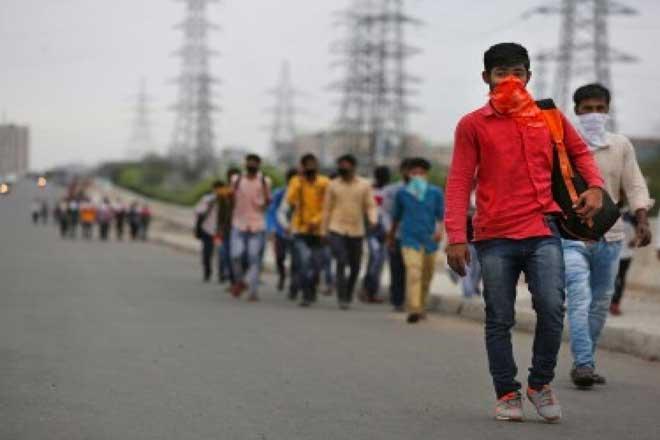‘Migrant, Unorganised Workers Acts Worst Examples of Disregard’

Kolkata, May 6: The Inter-State Migrant Workmen (Regulation of Employment & Conditions of Services) Act, 1979 (ISMW) and the Unorganised Workers’ Social Security Act, 2008 (UWSS) have not benefitted migrant and unorganised workers in any manner, according to experts.At a time when migrant workers have been the worst hit due to the novel coronavirus crisis, the two laws which intend to protect them have shown their weaknesses and the provision for funds to act on the enshrined objectives and welfare components have no priority in the authorities’ scheme of things.
Experts say the recent move by some state governments to enhance working hours without providing for treating the additional hours as overtime and the payment of due wages amounts to a violation of the Factories Act, 1948 and is contrary to Convention number 1 of the International Labour Organisation (ILO).
These are the opinions of experts that NewsClick spoke with about the twin issue.
According to Tapan Sen, General Secretary of the Centre of Indian Trade Unions (CITU), the ISMW Act, which provides for the registration of migrant workers by home states and host states with has a welfare component, wasa “violation” right from the day it took effect. “And, now, New Delhi proposes to repeal this Act instead of strengthening it and committing itself to its implementation,” he said, referring to the introduction of The Occupational Safety, Health and Working conditions Code Bill, 2019 in Parliament.
Amarjeet Kaur, General Secretary of the All-India Trade Union Congress (A-ITUC) was of the view that the relevant Acts should instead be revisited and amended to ensure their implementation. She mentioned that revisiting and amending the laws in question have become imperative because a welfare scheme, devoid of facilities for stay, access to basic amenities and coverage under public distribution system was “irrational”.
Ashok Ghosh, the General Secretary of the United Trades Union Congress (UTUC) had a different take. He argued that “migration for livelihood is a fundamental right” and that migration has been taking place for many, many years. But, the inhuman conditions the workers have been facing during the ongoing crisis due to the novel coronavirus, “raises doubtsabout whether the Centre is treating the stranded migrant workers as Indian citizens, which they are and about whom the Modi government has not shown any concern”, he observed.
Prabir Banerjee, President of Trade Union Coordination Centre (TUCC) said that at the moment, it appearedthat “we are restricting ourselves to the plight of inter-state migrant workers. Their suffering as they walk kilometre after kilometre to reach their native place is certainly a sad commentary on the state of affairs in our country”.
But, severe hardship is also faced by workers who move from their district to another within the same state; for example, those earning a livelihood by working in brick kilns, Banerjee mentioned.He added that an example of a “glaring violation of rules and the endless exploitation of workers” is found in Telangana, where huge expenditure is still being incurred on the capital city project and related development schemes. The project, which costs Rs 1,000 crore is above the order of the day in Telangana, Banerjee observed.
Professor K.R. Shyam Sundar, a labour economist who is a faculty member of the Jamshedpur-based Xavier School of Management said it was unfortunate that neither “state governments nor New Delhi took the ISME Act seriously”. It requires registration of migrant workers at both the host and home states and provides for welfare of registered migrant workers who come through contractors. He said it meant that if the formally channelised workers are not registered, their legal entitlements under the Act cannot be enforced. “The tragedy is that they will be deprived even though they may constitutea relatively small percentage of the total number of migrants – formal and voluntary,” he mentioned.
COVID-19 and the consequent lockdown “have brought the hapless workers to the mainstream space, thanks to their painful and often suicidal exodus missions,” he said. The situation has brought governance failures in the industrial relations system to the fore, he added, mentioning that it was high time that migrant workers’ contribution to the development process is recognised not only legally but also politically and socially.
According to labour lawyer Ramapriya Gopalakrishnan, the “miserable” condition of migrant workers has exposed shortcomings in the ISMW Act. She mentioned that it applied only to migrant workers recruited by intermediary contractors for employment in other states. It does not apply to migrant workers who are directly recruited by employers in other states. Moreover, she mentioned that the Act applied only to establishments where five or more inter-state migrant workers were engaged. Also, the Act provided for the registration of such establishments. It does not require registration of migrant workers. Thus, the legal framework needs to be changed to ensure that it is inclusive in the real sense of the term, she contended.
Regarding the UWSS Act of 2008, Sen said that when it was still a Bill, it was pressed ahead by the Congress-led United Progressive Alliance government by “ignoring” all pro-worker recommendations of the National Commission for Enterprises in the Unorganised Sector (NCEUS)s and the Parliamentary Standing Committee on Labour.
At the time, most of the welfare and social security schemes appended to the Act were meant for people who were Below Poverty Line. But, even in those cases, the qualifying definition and income level were so “restrictive” that an overwhelming majority of unorganised workers would not benefit, she contended.
Instead of improving upon it through an amendment, the Centre has proposed a new Social Security Code Bill, 2019, which has no provision for the collection of cess from employers to fund welfare activity. An exception, however, has been proposed only for the construction sector, according to Sen.
Kaur said therewas a problem with the Act itself. She mentioned that there were no guidelines and no directionsfor resource generation. “Responsibilities of the state governments have not been defined and the Centre assumes no responsibility,” she observed.
Ghosh said that such laws do not carry any meaning if the coverage is not universal. In West Bengal, he observed that labour is not a basic issue with the state government. Banerjee said that some attempts to act on the law were made by the Left Front government in West Bengal. However, for the Trinamool Congress ministry, “party-baazi is a better option”, he added.
According to Prof Shyam Sundar, the 2008 Act was a “damp squib”, when judged by the recommendations of NCEUS. It did not provide for a social security fund, he said, mentioning thatthe then existing welfare schemes were hurriedly brought under its ambit. The formation of a national social security board remained an intention on paper, he mentioned.District authorities were to issue identity cards which were intended to be smart cards with unique identification numbers. And, those were to be portable. “In respect of this Act governance failure is palpable in this time of crisis,” Prof. Shyam Sundar pointed out.
While hearing writ petitions for the redressal of grievances of the migrant labourers in different parts of the country Chief Justice of India S.A. Bobde and Justice L. Nageswara Rao on March 31, 2020, said: “It is well known that panic can severely affect mental health... The anxiety and fear of the migrants should be understood by the Police and other authorities... they should deal with the migrants in a humane manner... We expect those concerned to appreciate the trepidation of the poor men, women and children and treat them with kindness.”
According to the proposed law, factory owners are being allowed to engage workers for up to 12 hours but not treat the extra four hours as overtime qualifying for payment of wage at double the rate. It may be pointed out that on different dates in April, the notification route was adopted by the Gujarat, M.P. and Himachal governments (all Bharatiya Janata Party-ruled states). The notification route was also taken recourse to by the Punjab government. Gopalakrishnan pointed out that Gujarat, MP and Himachal had invoked powers granted under Section 5 of the Factories act, 1948. The notifications had been issued on the ground of an existing public emergency and are valid for three months, i.e., until mid-July 2020.
The Congress-ruled state of Punjab has extended working hours by exercisingits power under Section 65 of the Act, “which grants flexibility to deal with an exceptional pressure of work”. But, it does not specify that wages will be paid at the normal rate. There is scope to interpret that for the additional four hours, overtime wages at twice the rate will be paid. The action in the other three states lends itself to the inference that overtime wages will not be paid.
From 2014, the Centre has been trying to amend the Factories Act and increase the number of work hours. It has not succeeded because of stiff resistance from trade unions. The notification route had been used to avoid prior consultation with trade unions. Such an extension of work hours is contrary to Convention number 1 of the ILO relating to hours of work, which has been ratified by India and which provides for a maximum of eight hours and 48 hours a week, Gopalakrishnan pointed out to NewsClick.
Citing research findings, the labour economist said that economic efficiency is unlikely to be maximised as longer hours of work create fatigue, disturb work-life balance and even increase the probability of occupational accidents.
UTUC general secretary and the TUCC president indicated to NewsClick that after the lockdown was withdrawn and the situation inched towards normalcy, they would seriously consider taking the matter to an appropriate court of law.
Get the latest reports & analysis with people's perspective on Protests, movements & deep analytical videos, discussions of the current affairs in your Telegram app. Subscribe to NewsClick's Telegram channel & get Real-Time updates on stories, as they get published on our website.
























